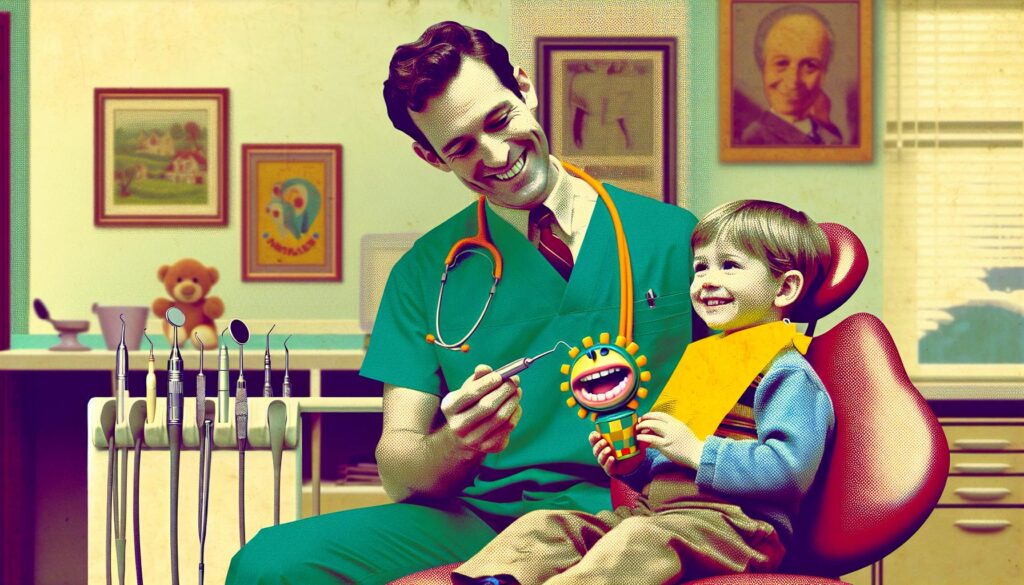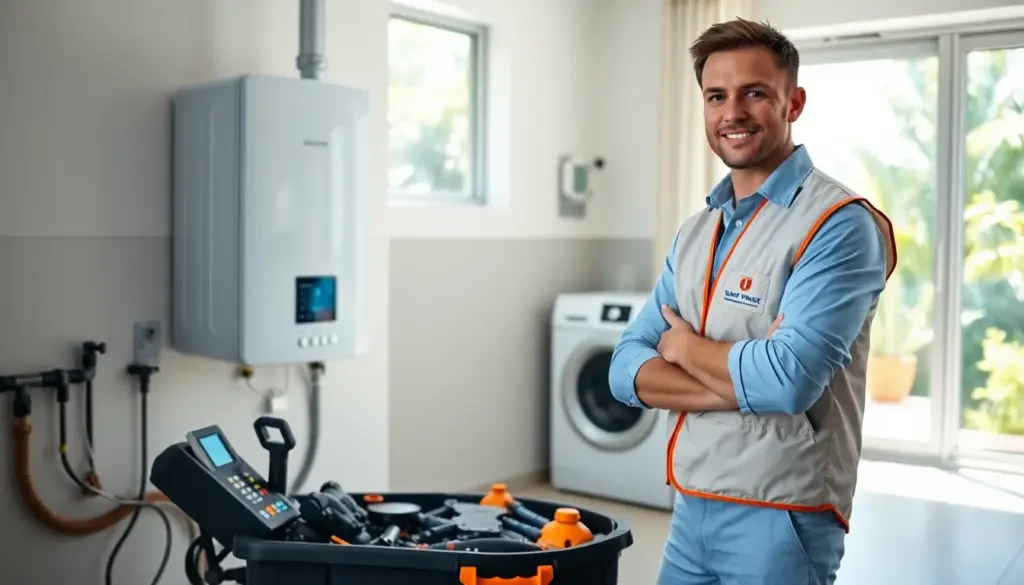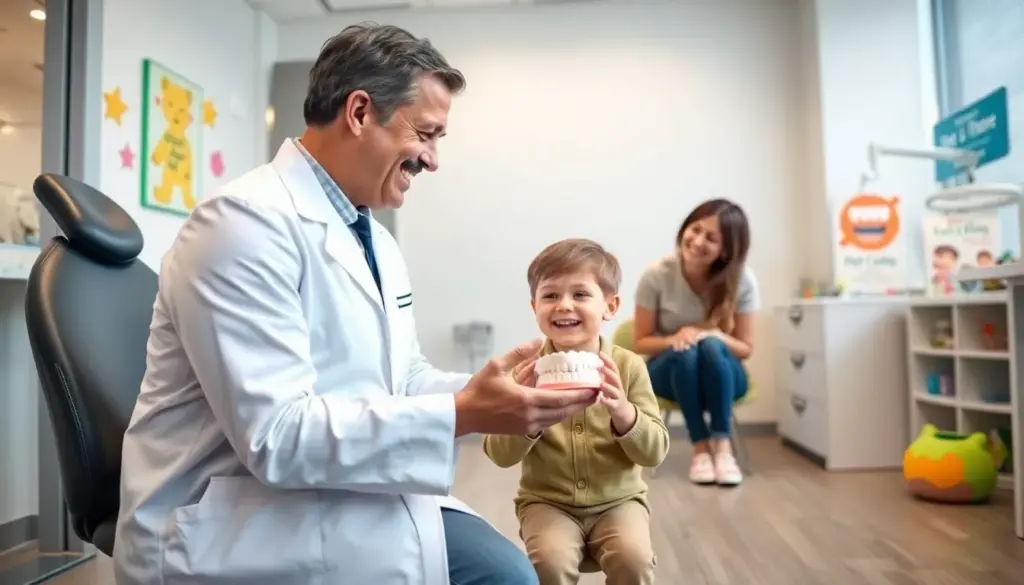Navigating dental visits can be a daunting experience for anxious children, especially those with special needs. Special kids dentists are trained to create a calm and supportive environment, using techniques tailored to each child’s unique requirements. This article explores the strategies these professionals employ to ease anxiety and ensure a positive dental experience, highlighting the importance of compassionate care in fostering lifelong oral health habits.
Key Takeaways
- Understanding Anxiety: Recognising the common causes and signs of dental anxiety in children is crucial for special kids dentists to tailor effective strategies.
- Expertise of Special Kids Dentists: These professionals undergo specialised training in paediatric dentistry and child psychology, enabling them to handle anxious children with expertise.
- Effective Communication: Using clear, age-appropriate language and visual aids helps to alleviate children’s fears and fosters trust during dental visits.
- Behavioural Techniques: Strategies such as gradual exposure, positive reinforcement, and distraction techniques play a vital role in reducing anxiety and promoting cooperation.
- Sedation Options: Specialised sedation methods, including nitrous oxide and oral sedation, provide additional comfort for children with severe anxiety during dental procedures.
- Comfortable Environment: Creating a welcoming and supportive atmosphere in the waiting room and during appointments significantly reduces children’s anxiety, ensuring a more positive dental experience.
Understanding Anxious Children
Anxiety in children during dental visits often arises from several factors. Understanding these factors helps special kids dentists tailor their approaches to manage anxiety effectively.
Common Causes of Dental Anxiety
- Fear of Pain: Children may associate dental procedures with pain from previous experiences, leading to heightened anxiety.
- Unfamiliar Environment: The dental office’s clinical atmosphere, sounds, and smells can be intimidating, contributing to feelings of unease.
- Separation Anxiety: Young children may experience stress when away from their parents or guardians during appointments.
- Loss of Control: Dental procedures often require children to lie back in a chair, which may feel restrictive and frightening.
- Social Factors: Comments from peers or media portrayals of dental visits may instill fear and anxiety in children.
- Physical Symptoms: Children may exhibit signs such as sweating, trembling, or clenching their fists.
- Verbal Expressions: Anxious children often voice their fears by saying they don’t want to go to the dentist or express concern about pain.
- Behaviour Changes: Increased clinginess, withdrawal, or tantrums can signal anxiety during dental visits.
- Avoidance: A child may refuse to cooperate with appointments, leading to missed visits and ongoing dental issues.
- Withdrawal: An anxious child may become unusually quiet or unresponsive when faced with dental procedures.
Recognising these causes and signs enables special kids dentists to implement targeted strategies, ensuring a more positive dental experience for anxious children.
Role of Special Kids Dentists

Special kids dentists focus on creating a supportive environment for anxious children. These professionals utilise tailored techniques and approaches to address the unique needs of their young patients.
Training and Expertise
Special kids dentists undergo additional training in paediatric dentistry, specialising in child psychology and managing special needs. They gain skills in identifying specific anxieties and tailoring their care strategies to individual situations. This expertise equips them to handle various dental scenarios effectively, ensuring a child-friendly experience.
Approaches to Communication
Special kids dentists employ clear and simple communication strategies to alleviate anxiety. They use age-appropriate language and visual aids to explain procedures. Additionally, they encourage questions and provide reassurance throughout visits. By fostering trust and understanding, these professionals help children feel more comfortable during dental appointments.
Techniques Used to Calm Anxious Children
Special kids dentists utilise a range of techniques tailored to calm anxious children during dental visits. These methods aim to create a safe and reassuring environment, addressing the unique needs of each child.
Behavioural Techniques
Behavioural techniques focus on modifying children’s responses to anxiety-inducing situations. These methods include:
- Gradual Exposure: Dentists introduce the child to the dental environment slowly, familiarising them with sounds and sights over several visits.
- Positive Reinforcement: Reward systems encourage good behaviour by praising or offering small rewards for cooperation during appointments.
- Distraction Strategies: Engaging children with toys, games, or videos can keep their minds off the procedure.
- Relaxation Techniques: Breathing exercises and guided imagery help children focus on calming thoughts, reducing anxiety.
These behavioural techniques foster a sense of control and safety, making dental visits less intimidating.
Sedation Options
Sedation options provide effective alternatives for managing severe anxiety in children. Special kids dentists may offer:
- Nitrous Oxide: Also known as “laughing gas,” nitrous oxide helps relax children during procedures while keeping them awake and responsive.
- Oral Sedation: This medication administers a calming effect and is suitable for children with moderate anxiety levels.
- IV Sedation: Administered through intravenous methods, this option provides deeper sedation for children who require more extensive dental work.
Sedation options ensure that anxious children receive necessary dental care without distress, enhancing their overall experience.
Creating a Comfortable Environment
Creating a comfortable environment is crucial for reducing anxiety in children during dental visits. Special kids dentists implement specific strategies to ensure that the space feels welcoming and safe.
Waiting Room Experience
The waiting room plays a key role in calming anxious children. Special kids dentists design these areas with bright colours, engaging toys, and books to create a friendly atmosphere. They often incorporate soothing music or gentle sounds, helping to distract children from their worries. Family members can stay close, providing reassurance and comfort. Staff members trained in child interaction greet families warmly, establishing a friendly rapport from the moment they walk in.
Appointment Management
Effective appointment management enhances the overall experience. Special kids dentists schedule shorter visits to prevent overwhelming sessions. They use clear communication to explain each step of the process in simple language, allowing children to know what to expect. A dentist may involve the child in decision-making, giving them a sense of control over their dental care. Additionally, they employ techniques such as showing tools beforehand and offering breaks during procedures, ensuring children feel relaxed throughout the appointment.
Conclusion
Special kids dentists play a vital role in transforming the dental experience for anxious children. By employing tailored strategies and creating a supportive environment, they ensure that each child feels safe and understood. Their expertise in child psychology and special needs equips them to address specific anxieties effectively.
Through compassionate care and innovative techniques, these professionals not only alleviate fear but also foster a positive attitude towards dental visits. This approach lays the groundwork for lifelong oral health habits, making each appointment a step towards a brighter, healthier future for children.
Frequently Asked Questions
What challenges do anxious children face during dental visits?
Anxious children often experience fear of pain, unfamiliar environments, and separation anxiety during dental visits. These challenges can lead to physical symptoms like sweating or crying, making it difficult for both the child and the dentist to proceed with care.
How can special kids dentists help anxious children?
Special kids dentists are trained to create a calming atmosphere. They use tailored techniques, clear communication, and compassion to address the unique needs of anxious children, making dental visits more positive and comfortable.
What are common causes of dental anxiety in children?
Common causes of dental anxiety in children include fear of pain, unfamiliar settings, separation from caregivers, loss of control over their surroundings, and social pressures. Understanding these factors helps dentists provide appropriate support.
What techniques do special kids dentists use to calm anxious children?
Special kids dentists employ various techniques such as positive reinforcement, gradual exposure, distraction strategies, and relaxation exercises. They may also use sedation options like nitrous oxide to manage severe anxiety effectively.
How do special kids dentists communicate with anxious children?
These dentists use clear and simple language, visual aids, and encourage questions to foster trust and understanding. This approach helps children feel more comfortable and prepared for their dental appointments.
What should I expect in a practice for anxious children?
Practices tailored for anxious children often feature welcoming waiting rooms with bright colours, engaging toys, and soothing music. Appointments are managed to include shorter visits and clear communication to reduce anxiety.
How important is the dental environment for anxious children?
Creating a comfortable dental environment is crucial for reducing anxiety. A warm, inviting atmosphere, along with effective appointment management and involving children in decisions, significantly enhances their dental experience.
What is the significance of compassionate care in dentistry for children?
Compassionate care is vital as it helps develop trust and rapport between the dentist and the child. This relationship encourages children to participate actively in their dental health, shaping positive lifelong oral health habits.


